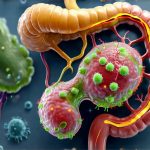Our bodies are astonishingly complex ecosystems, harboring trillions of microorganisms – bacteria, viruses, fungi, and others – collectively known as the microbiome. For years, these microscopic inhabitants were largely overlooked, but recent advances in scientific understanding reveal their profound influence on nearly every aspect of our health, extending far beyond digestion. Increasingly, research is demonstrating a compelling link between the diversity and composition of our gut bacteria and our ability to resist seasonal illnesses like the common cold, influenza, and even COVID-19. This isn’t about “killing” bacteria; it’s about fostering a thriving and balanced microbial community that actively supports our immune system and protects us from pathogens. Understanding tools doctors use can be the first step to assessing your gut health.
The traditional view of immunity focused heavily on dedicated immune cells and antibodies. However, this picture is now being dramatically reshaped as we recognize the gut microbiome as a crucial training ground for the immune system. From early infancy, exposure to diverse microbes helps “educate” the immune system to distinguish between harmless commensal bacteria and dangerous pathogens. A less diverse gut microbiome, often stemming from factors like antibiotic overuse, poor diet, or chronic stress, can lead to an impaired immune response and increased susceptibility to illness. The emerging science is painting a picture where a robust and varied microbial landscape isn’t just associated with better health; it’s actively required for optimal immune function and resilience against seasonal threats. Recognizing signs your reflux might be gut related is also important.
The Gut Microbiome & Immune System Crosstalk
The connection between the gut microbiome and the immune system is remarkably intricate, operating through several key pathways. One of the most important is the development of gut-associated lymphoid tissue (GALT), which represents a significant portion of our entire immune system. GALT acts as a first line of defense against pathogens entering the body through the digestive tract. A diverse microbiome stimulates GALT, enhancing its ability to recognize and respond to threats effectively. Furthermore, gut bacteria produce metabolites – small molecules resulting from microbial metabolism – that directly influence immune cell function. Short-chain fatty acids (SCFAs), like butyrate, propionate, and acetate, are prime examples; these compounds have anti-inflammatory properties and help regulate the activity of various immune cells, including T cells and macrophages.
The microbiome also impacts the production of secretory IgA (sIgA), an antibody that plays a critical role in neutralizing pathogens within the gut lumen. A diverse microbiome promotes increased sIgA production, further strengthening our defenses against invading microbes. Importantly, the influence extends beyond the gut itself. The “gut-lung axis” is now well recognized; communication between the gut and lungs via immune cells and microbial metabolites can significantly impact respiratory health. This means a healthy gut microbiome isn’t just about digestive wellness – it’s also about bolstering our defenses against respiratory illnesses. A compromised gut microbiome can weaken this crucial link, increasing vulnerability to infections. Focusing on how to balance your bacteria with diet is a great place to start.
Finally, the microbiome influences the balance between different types of T helper cells – namely Th1 and Th2 responses. A balanced immune response requires both, but an overactive Th2 response is often associated with allergies and increased susceptibility to viral infections. A diverse gut microbiome helps maintain this delicate balance, promoting a more robust and adaptable immune system overall.
Factors Disrupting Gut Microbiome Diversity
Several modern lifestyle factors contribute significantly to reduced gut microbiome diversity. Perhaps the most impactful is antibiotic use. While essential for treating bacterial infections, antibiotics indiscriminately kill both harmful and beneficial bacteria, disrupting the delicate ecosystem within our gut. Frequent or prolonged antibiotic use can lead to a long-term reduction in microbial diversity, leaving us more vulnerable to illness.
Diet plays an equally crucial role. A diet high in processed foods, sugar, and saturated fats, and low in fiber, has been shown to negatively impact microbiome composition. Fiber acts as food for beneficial gut bacteria, promoting their growth and increasing diversity. Conversely, a Western-style diet promotes the growth of less desirable microbial species. Chronic stress also significantly impacts the gut microbiome through the hypothalamic-pituitary-adrenal (HPA) axis. Stress hormones can alter gut motility, permeability, and microbial composition, contributing to dysbiosis – an imbalance in the gut microbiome. Considering combining warm liquids with light meals can also support gut health.
Beyond these major factors, other influences include:
– Lack of exposure to diverse environments (e.g., living in overly sanitized environments).
– Cesarean birth (babies born vaginally acquire microbes from their mother’s birth canal).
– Limited physical activity.
– Environmental toxins and pollutants.
Strategies for Enhancing Gut Microbiome Diversity
Fortunately, there are many proactive steps we can take to nurture a healthier gut microbiome and bolster our resilience against seasonal illnesses. A cornerstone of any gut health strategy is dietary modification. Increasing fiber intake through whole grains, fruits, vegetables, legumes, and nuts provides essential nourishment for beneficial gut bacteria. Incorporating fermented foods like yogurt, kefir, sauerkraut, kimchi, and kombucha introduces live probiotics – beneficial microorganisms that can help diversify the gut microbiome. Utilizing gentle cooking methods can also ease gut load.
Another key approach is to minimize unnecessary antibiotic use. Discuss with your healthcare provider whether an antibiotic is truly necessary before taking one, and always complete the full course as prescribed. Consider prebiotic foods which feed existing beneficial bacteria in your gut. Examples include garlic, onions, leeks, asparagus, bananas, and oats. Prebiotics support the growth of a diverse microbial community without directly introducing new organisms. You can also learn how to balance gut acidity through smart eating habits.
The Future of Microbiome Research & Personalized Interventions
The field of microbiome research is rapidly evolving, with exciting advancements on the horizon. Researchers are developing more sophisticated techniques to analyze gut microbiome composition – including metagenomics and metabolomics – allowing for deeper insights into its functional capabilities. This knowledge will pave the way for personalized interventions tailored to an individual’s specific microbial profile. Imagine a future where dietary recommendations, probiotic formulations, or even fecal microbiota transplantation (FMT) are optimized based on your unique microbiome makeup!
Furthermore, scientists are exploring the potential of manipulating the gut microbiome to enhance vaccine efficacy and improve treatment outcomes for various diseases. The promise of “microbiome-based therapies” is significant, offering a novel approach to preventative and restorative healthcare. While still in its early stages, this research holds immense potential for revolutionizing how we address health challenges related to seasonal illnesses and beyond.
It’s important to remember that the gut microbiome is a complex ecosystem, and there’s no one-size-fits-all solution. Building a healthier gut is an ongoing process, requiring consistent effort and lifestyle adjustments. Focusing on diet, stress management, and mindful antibiotic use are all crucial steps towards fostering a thriving microbial community and strengthening our natural defenses against illness. The future of health isn’t just about treating disease; it’s about nurturing the microscopic ecosystems within us to promote long-term well-being and resilience. Considering seasonal produce can also help support gut diversity.


















